
Implicit to the cost approach is the idea that a real estate investor will not pay more for a resale property than it would cost to construct the same home from the ground up. The cost approach is often used to value rental properties where recent sales are difficult to find, and for property that currently is not generating income. On the other hand, an investor may be able to gradually increase the NOI from a low cap rate property by increasing the rent each year while keeping operating expenses under control. For example, a property may be underpriced because the property requires a lot of repairs.

However, a rental property with a cap rate significantly higher than similar rentals may not be as profitable as it seems. Generally speaking, the higher the cap rate or potential return of a rental property is, the better the investment may be. Operating expenses average 36% ($7,200) of the annual income, generating an NOI of $12,800īy using the income approach, the estimated percentage return of the rental property is: To illustrate how the income approach is used for rental property valuation, let’s assume the rental income from a $175,000 home is $20,000 per year.
Cap Rate = NOI / Property Price or Value. NOI only includes normal property operating expenses and does not take into account mortgage and interest payments, capital repair costs, and depreciation expense.Īlso known as the capitalization rate or cap rate approach, cap rate is the percentage return calculated by dividing the first year of NOI by the property price: The income approach for valuing a rental property considers the net operating income (NOI) the property is generating compared to the property value or purchase price. The best comparable sales are homes with characteristics as close as possible to the property being valued, such as similar square footage, age, number of bedrooms and bathrooms, and lot size.įor all practical purposes, the sales comparison approach does not value an investment property differently from an owner-occupied property.įor example, if 5 similar homes used as primary residences recently sold for between $150 and $160 per square foot, a 1,500 square foot rental property with similar characteristics to the comps would also be valued at between $225,000 and $240,000. Ideally, comparable properties have sold within the past 30 days or so, depending on the level of activity in the local real estate market. 
The sales comparison approach is used by appraisers and real estate agents to determine how much a home is worth by looking at recent comparable sales.Īlso known as an SCA, comps, or the price-per-square foot approach, the sales comparison approach compares similar homes that have recently sold over a specific time frame. Investors may wish to use more than one way to value a rental property to generate a range of potential values. Keep in mind that there isn’t a single right way to value a property. Here are 5 different methods that real estate investors use to determine the possible value of a rental property. Automatically updating the estimated value of a rental property can provide more accurate measures of potential financial performance and owner’s equity.
 Online property valuations calculators simplify the process of forecasting the potential return of a rental property.
Online property valuations calculators simplify the process of forecasting the potential return of a rental property.  Methods for valuing a rental property include gross rent multiplier, sales comparison approach, income approach, and the capital asset pricing model. Rental property valuation is different from valuing a primary residence because of the potential for monthly rental income. In this article, we’ll discuss 5 methods for rental property valuation that real estate investors use, along with a new way for investors to automatically receive updated property values each and every month. In addition to providing tenants with a nice place to live, investors also purchase rental property for the potential monthly rental income and increase in property value over the long term Real estate investors value rental property differently from regular homeowners.
Methods for valuing a rental property include gross rent multiplier, sales comparison approach, income approach, and the capital asset pricing model. Rental property valuation is different from valuing a primary residence because of the potential for monthly rental income. In this article, we’ll discuss 5 methods for rental property valuation that real estate investors use, along with a new way for investors to automatically receive updated property values each and every month. In addition to providing tenants with a nice place to live, investors also purchase rental property for the potential monthly rental income and increase in property value over the long term Real estate investors value rental property differently from regular homeowners.








 0 kommentar(er)
0 kommentar(er)
